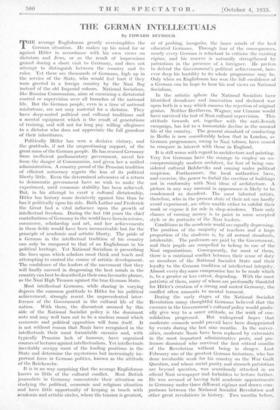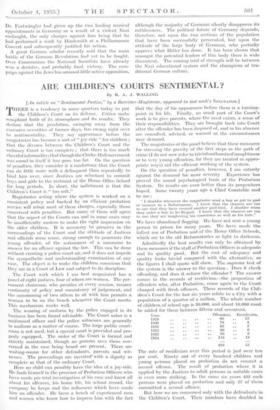THE GERMAN INTELLECTUALS
By EDWARD SEYMOUR
THE average Englishman greatly oversimplifies the German situation. He makes up his mind for or against Hitler in accordance with his own views on dictators and Jews, or as the result of impressions gained during a short visit to Germany, and does not attempt to distinguish between the country and its ruler. Yet there are thousands of Germans, high up in the service of the State, who would feel hurt if they were greeted in a foreign country by the Nazi flag instead of the old Imperial colours. National Socialism, like Russian Communism, aims at exercising a dictatorial control or supervision over all branches of the national life. But the German people, even in a time of national misfortune, are not easy material for a dictator. They have deep-seated political and cultural traditions and a mental equipment which is the result of generations of training, and will not for long pay, willing allegiance to a dictator who does not appreciate the full grandeur of their inheritance.
Politically Hitler has won a decisive victory, and the gratitude, if not the unquestioning support, of the great mass of the German people. He has rescued Germany from inefficient parliamentary government, saved her from the danger of Communism, and given her a unified , administration. A country proud of the Prussian tradition of efficient autocracy regrets the loss of its political liberty little. Even the determined advocates of a return to democratic government have no wish to make the experiment, until economic stability has been achieved. But, in his attempt to exert a cultural dictatorship, Hitler has history more decisively against him than he has it politically upon his side. Both Luther and Frederick the Great had a vital influence upon the growth of intellectual freedom. During the last 150 years the chief contributions of Germany to the world have been in science, commerce, scholarship and art, and her achievements in these fields would have been inconceivable but for the principle of academic and artistic liberty. The pride of a German in the intellectual tradition of his country can only be compared to that of an Englishman in his political heritage. Yet National Socialism is prescribing the lines upon which scholars must think and teach and attempting to control the course of artistic development. The confidence of the leaders of the movement that they will finally succeed in dragooning the best minds in the country can best be described,in their own favourite phrase, as the Nazi High Treason against the true German State.
Most intellectual Germans, while sharing in varying degrees the common gratitude to Hitler for his political achievement, strongly resent the unprecedented inter- ference of the Government in the cultural life of the nation. With them, the discontent aroused by this side of the National Socialist policy is the dominant note and may well turn out to 'be a nucleus round which economic and political opposition will form itself. It is not without reason that Nazis have recognised in the intellectuals their most formidable enemies and, with typically Prussian lack of humour, have organised courses of lectures against intellectualism. Yet intellectuals inevitably occupy' most of the leading positions in the State and determine the mysterious but increasingly im- portant force in German politics, known as the attitude of the Reichswehr.
It is in no way surprising that the average Englishman knows so little of the cultural conflict. Most British journalists in Germany concentrate their attention on studying the political, economic and religious situation and have little opportunity of keeping in touch with academic and artistic circles, where the tension is greatest, or of probing, incognito, the inner minds of the best educated Germans. Through fear of the consequences, nearly every German is reluctant to criticise the existing regime, and his reserve is naturally strengthened by patriotism in the presence of a foreigner. He 'prefers to defend the Government's political achievement, how- ever deep his hostility to its whole programme may be. Only when an Englishman has won the full confidence of a German can he hope to hear his real views on National Socialism.
In the artistic sphere the National Socialists have identified decadence, and innovation and declared war upon both in a way which ensures the rejection of original genius. Neither Beethoven, Wagner, nor Cezanne would have survived the test of Nazi cultural supervision: This attitude towards art, together with the -anti-Jewish. campaign, has led to a lamentable decline in the musical life of the country. The general standard of conducting in Berlin is now considerably below that in London, as German programmes, owing to Nazi taboos, have ceased to compare in interest with those in England.
It is still worse with regard to architecture and painting. Very few Germans have the courage to employ • an un- compromisingly modern architect, for fear of being con- sidered cultural Bolsheviks and coming under political suspicion. Furthermore, the local authorities have, and exercise, the power to forbid the erection of buildings not in conformity with Nazi ideas of architecture. A , picture in any way unusual in appearance is likely to be condemned as decadent. The most talented 'artists, therefore, who in the present state of their art can hardly , avoid experiment, are often unable either to exhibit their work or expose it for sale in shop-windows. Their only chance of earning money is to paint in some accepted style or do portraits of the Nazi leaders.
Conditions in the academic world arc equally depressing. The position of the majority of teachers and a large proportion of the students is, by all normal standards, intolerable. The professors are paid by the Government, and their pupils are compelled to belong to one of the, Nazi organisations. Consequently, for most of them, there is a continual conflict between their sense of duty as members of the National Socialist State and their loyalty to the German tradition of intellectual integrity. Almost every day some compromise has to be made which is, to a greater or less extent, degrading. With the most patriotic of them, many of whom are profoundly thankful for Hitler's creation of a strong and united Germany, the conflict often amounts to mental torment. • During the early stages of the National Socialist, Revolution many thoughtful Germans believed that the excesses in the Government's eulturarpolicy mould gradu- ally give way to a saner attitude, as the work of con- solidation progressed. But widespread hopes - that moderate counsels would prevail have been disappointed by events during the last nine months. In the univer- sities, moderate Nazis have been 'replaced by extremists in the most important administrative posts, and pro- fessors dismissed who survived the first critical months of the Revolution without being in danger. Last February one of the greatest German historians, who has done invaluable work. for his country on the War 'Guilt Question, and whose racial purity and staunch patriotism are beyond question, was scurrilously attacked in an official Nazi newspaper and forbidden to lecture further. He was accused of having held academic appointments in Germany under three different regimes and drawn corn- - parisons between the National Socialist Revolution and other great revolutions in history. Two months before, Dr. Furtwilngler had given up the two 'leading Musical. appointments in Germany as a result of a violent Nazi onslaught, the only charges against him being that he had performed a work by Hindemith at a Philharmonic Concert and subsequently justified his action.
• A great German scholar recently said that the main battle of the. German Revolution had yet to be fought. Over Communism the National Socialists have already won a decisive, and probably, final, victory. The cam- paign against. the Jews has aroused little active opposition, although the majority of Germans silently disapprove its ruthlessness. The political future of Germany depends, therefore, not upon the two sections of the population that have been successfully persecuted, but upon the attitude of the large body of Germans, who partially approve what Hitler has done. It has been shown that amongst the potential leaders of this body there is wide discontent. The coming trial of strength will be between the Nazi educational system and the champions of tram ditional German culture.











































 Previous page
Previous page